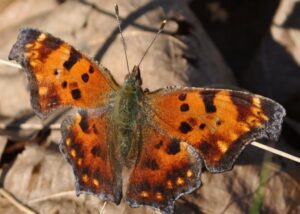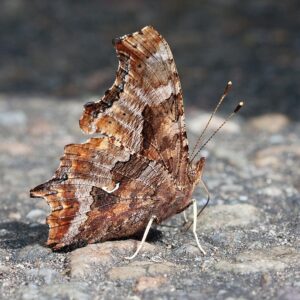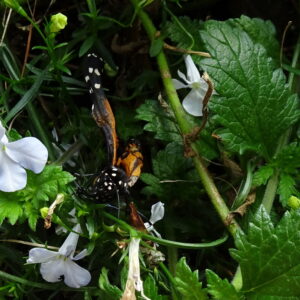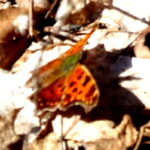 On a rare sunny April afternoon, I sit on a round stone near Vic’s cairn and watch the nearby stream. The forest floor is brown with last fall’s leaves.
On a rare sunny April afternoon, I sit on a round stone near Vic’s cairn and watch the nearby stream. The forest floor is brown with last fall’s leaves.
I notice a flash of orange. A butterfly rests on a leaf in the middle of the path, opening and closing its wings while I fumble for my camera. It has deep curving indentations on the outer wings with a wingspan of two inches, about half the size of a Monarch but, from a distance, it has a similar intense orange. It’s much too early for a Monarch.
 “Wait! Wait!” I whisper, as it flutters down the path, exploring its new world. I sit without stirring, hoping it will land near me, so I can take a clear photo to replace the poor one I took as it flew. Instead, it disappears into the swamp.
“Wait! Wait!” I whisper, as it flutters down the path, exploring its new world. I sit without stirring, hoping it will land near me, so I can take a clear photo to replace the poor one I took as it flew. Instead, it disappears into the swamp.
Back home, I read that Eastern Comma butterflies winter over as adults and dine on sap or dung on forest floors. They prefer moist wooded areas.
A memory floods me of a dying Monarch I tended a few summers ago. I couldn’t save that butterfly’s life, but I was moved by her persistence as she crawled through flowers in a pot as she lived out her short life.
“One crumpled wing, stuck inside her chrysalis.
She opens the other wing to the sun’s warmth.
Unable to fly or sip nectar,
Death is her salvation.”
Will there be any Monarchs this year after 60% of the population perished in Mexico this past winter?
I long for orange beauties in June, soaring and laying eggs in milkweed fields, but I already grieve their absence.
***
Eastern Comma Butterflies: Common Domain Photos, Wikipedia
Wings open: Eastern Comma (Polygonia comma) found along the Blue Ridge Parkway in North Carolina. (Kaldari, own work)
Wings closed: Eastern Comma photo by Aaron Carlson, Menomonie, WI, USA
The first butterfly of the season is always a surprise. “Oh, I wasn’t sure you’d come.”
I’ve only had a few Monarchs infected with OE which is rare in my area, but it’s a growing danger as the climate warms. For an article about OE, see What is OE? Monarch Parasites. OE is a parasite called Ophryocystis elektroscirrha and it thrives on milkweed plants. Monarchs can’t survive without milkweed, so I’ll keep doing the best I can to care for the butterflies. I can’t save all of them, but I can save a few.


How wonderful Elaine!
Good to see your post.
Thank you, Susan. May it be a summer of butterfly photos, Monarchs or not. We know my preference, but I don’t get to choose. I just watch.
Dear Elaine, how wonderful to have seen your first butterfly this year, and to do so near Vic’s cairn. A double delight, oh how your heart must’ve leapt! And it’s great to know you’re back in your forest walking trails, following your long illness. The link you include re OE was interesting, thank you. Naturally, I’m very pleased to hear it’s rare in your area.
Despite the relentless rain and squally winds here on the south coast (UK), I’ve seen six butterflies so far this spring, my favourite being a striking male Brimstone. I don’t know what it is about them but I can’t stop myself from wanting to chase them! With June just around the corner, it’s not long now, fingers crossed, for more flashes of orange to arrive!
“Death is her salvation.” Wow, did you write these poetic words? I ab-soul-utely love the last line! Hope you’re feeling so much better now my dear friend. Love and light, Deborah.
Yes, my heart soared when I saw that butterfly and I haven’t seen another. I walk slowly. This has been a strange time, but as I read about anemia, it presents like this–slowly depleting the energy without being noticed until it can no longer be ignored. OE is a big problem in the southern (warmer) states here, and it may become a bigger problem as the climate warms. It’s a dangerous world.
Relentless rain! Oh! And of course the butterflies have to feed themselves even in the rain. I hope you get a sunny break. It’s been cold here and a few cool days are normal enough, but it’s been consistently cold. Today is warmer with a hazy sun–like eclipse day which was cooler with more clouds. Finally, of course, I wrote those words, dear friend. If someone else had written them I would have fully attributed the words to them. I’m feeling slowly better, but this is a long haul and it may take another month to get my iron levels back to a comfortable level. We shall see. I’ve talked to many doctors and physician’s assistant and the general advice is to do what I’m doing and wait. I dug myself into a hole without realizing it and have to climb out–slowly. Sending you love, clear skies, and butterflies.
What a surprise, my dear Elaine. First, I finally got your post, and second, it seems your beloved friends and majesty are returning slowly but surely! I don’t know how cold your April weather is now up there, but here we have an icy one, even a winter kind of temperature (ca. 2 degrees in the morning). Anyway, I hope Spring shines brighter and your Monarch returns soon. However, this OE sounds terrible! Take care, my lovely and wise friend. Blessing.
PS: I want to write a post about my trip to Southern Germany, and I will talk about visiting a butterfly garden.
Thanks for your tolerance, Aladin. The bad monsters convinced feverish me to shared this post on Facebook before sending it to subscribers. This is the way it goes with a woman with tricky astrological aspects. There must be a Tarot card for this trickster who guides my fingers and actions. Monarchs may not return and OE is horrible and deforms them. We’ll see how nature responds. Be well and have faith the world can heal.
It’s so good to see that you’re back out on the trails, slowly but surely your strength will return…how uplifting it must have been for you to see your first butterfly of the season near Vic’s cairn.
It’s been such a strange end to winter and start to spring here. I saw my first butterfly in mid-February this year during an unseasonably warm spell – a small tortoiseshell I think. Then there was nothing and then, on a boggy but warmer woodland walk last week, despite the rain and cold we’ve had this April, I saw Orange tips, Brimstones, Commas and Peacocks. It was so joyful – I think they were gathering near the abundance of woodland flowers – bluebells, anemones, celandines, stitchwort, red campion and even yellow archangels all flowering together! So strange…the climate is changing but nature still seems to be finding a way to show us her beauty.
I hope that the Monarchs find their own way of working with mother nature to fight OE and come back up to your Milkweed fields to see you! Sending you healing love and light.
I haven’t been back to the forest since, Lin, although I’ve seen many doctor’s offices and imaging machines as my medical people try to figure out what’s going on with my body. We know I’m anemic, but I should be recovering by now. What’s holding the body back? It’s forcing me to let go of pride and teaching me about surrender. I’m trying not to let go of hope.
I’m glad you see such beautiful butterflies. We’re back to a period of cool rain and clouds, so no more butterflies the last few days, but the bluebirds are courting every morning near the nesting boxes. The flowers in the field wait for sun, but lupine leaves are everywhere, so soon there will be lupines. I don’t know some of the flowers you mention. Yellow archangels? How celestial. I won’t know about Monarchs until late May or June and last year they came late because the weather was odd then, too. I do see small milkweed plants beginning to grow. Speaking of healing, I’m brewing a cup of ginger tea. Sending love and sunshine.
This piece left me feeling odd. I can’t place the right word to express it. You wait for the Eastern Comma to return so you can photograph it, instead it disappears into the swamp. You wait for the monarchs to return but 60% have died. You wait for your levels of iron to rise. It’s the waiting that seems unlike you.
I think of you as observing in a moment, rather than waiting for a future. It is a subtle feeling.
And I agree with Deborah “death is her salvation” is a powerful turn of words.
I too am so glad you are on the return to more normal levels of energy. This illness took you for a long ride.
May spring sunshine and flowers fill your world with more wonders and delights.
Maybe you wouldn’t recognize me, Lauren. I hardly know myself since I’ve never been sick like this. There’s a lot of waiting in learning to be a patient patient. Waiting for appointments, waiting for the technician at an imaging machine, waiting for an EKG or an x-ray, waiting for test results before scheduling the next test. I saw this world of illness from the outside with Vic, but now I’m in the middle of it. It’s all mixed with deafness which makes it hard to hear what’s going on. Medical people have been kind and helpful, but Anthony just volunteered to come to consulting appointments where I get results from a battery of tests. That will help a lot since I’m deafer than ever.
Not to be overly dramatic, but it may be “death is my salvation,” but my trusted Physician’s Assistant doesn’t think death is where this is heading. We need the key to unlock my vitality. I have Neptune square natal Mars which confuses the body and the understanding. Where is my Mars energy? A little lost. You can’t imagine how odd I feel as I wait for what comes next, but waiting is it’s own skill. I observe and do lots of waiting room mantra. The weather has been extra gloomy, but I’m grateful we don’t have to be concerned about drought or forest fires. With love and hope,
I’m living in Florida and have seen several Monarchs in the past month. While it’s not many, it seems more than I remember in recent years. However, I am living closer to some gardens now, so perhaps that explains it. Friends have been talking about the milkweed disease on certain species of the plant and some botanists are advising ripping out all types of milkweed, to stop the spread. Others say some varieties are fine to keep. It gets confusing as to the best approach. Challenging times, these.
Hi Monica. I know OE is a special problem in FL. I know one woman who was advised to destroy all her milkweed because it was so infested and the Monarchs were sick. I hope that’s not an issue for you. There must be a state agricultural agency where you can find out what to do or not do.
OE is a sad crippling disease, so let’s imagine beautiful perfectly healthy Monarchs and milkweed (all native natural plants) and well formed gliders laying many eggs on that milkweed. I wish you and the Monarchs good health. You said it perfectly: “challenging times, these.”
Dear Elaine,
Reading about your continued health challenges in this post and in the comments, I feel compelled to let you know healing thoughts are being sent your way.
I have been following your blog since shortly after my husband’s death of cardiac arrest in 2014 when we were in our mid-60s. Early on your blog was one of several written by widows which helped guide my way as I started on a very difficult and unexpected journey. Thank you for being an inspirational guide!
Over the years, both of our lives have evolved as is reflected in your blog. I’ve really enjoyed reading your posts about the Monarch butterflies and other nature topics while at the same time appreciating your continued mention of Vic.
You have become like a friend I look forward to hearing from, and I have been saddened by the turn your health has taken this year. May it help in some small measure to know that you are held in prayer by an unseen friend in Oregon.
Anne
Thank you, Anne. What a sweet and inspiring note. Vic died in 2008 and he’s still on my mind and in my heart. He feels like part of me and I remember his struggles with cancer in his last years. It was hard for him, but easier for me to stay inwardly calm about him than it is to stay peaceful about my own body’s struggles. I’ve had a rough go with health since January, but I think it’s resolving itself with time, an inhaler and finding ways to calm my breath. I need to focus on breathing exercises in a consistent way to regain confidence that I am OK for a woman who is 78. I’m going to put on my boots and take a slow walk with my dog, paying lots of attention to my quiet breath. Be well and thank you again.
Thank you for the kind reply, Elaine. I hope you had a nice walk with your dog and enjoyed rhythmic breathing in and out as you went along! I too feel my husband is a part of me, guiding and helping me, and I know Vic must be doing all he can to help you regain your health!
Thank you, Anne. I have a few expert helpers trying to figure this out and the possibilities are narrowing. I hope we figure it out soon so I feel less depleted to celebrate the spring. Some of the worst possibilities have been ruled out. Best to you.